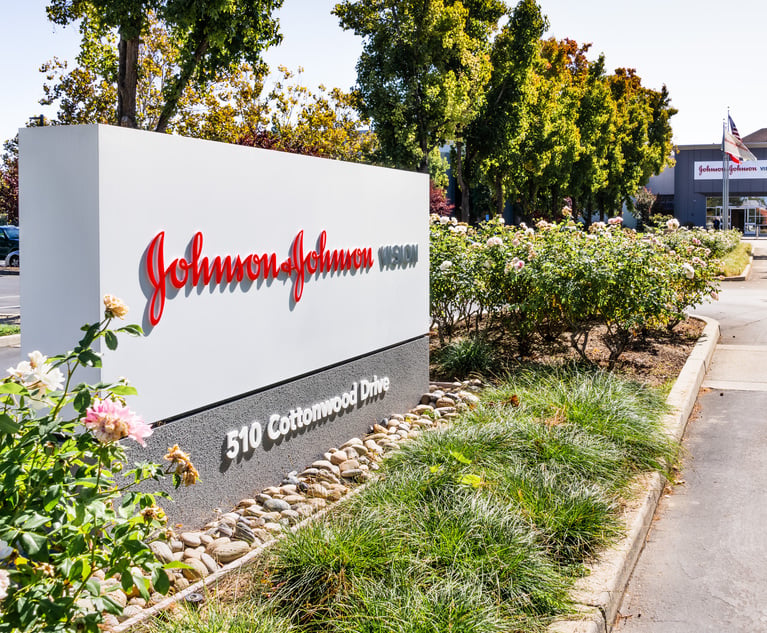 Hunter McMullin of Marshall Dennehey Warner Coleman & Goggin. Courtesy photo
Hunter McMullin of Marshall Dennehey Warner Coleman & Goggin. Courtesy photo Potential Clarity on Pennsylvania's Murky Products Liability Landscape
Recently granting allocator, Pennsylvania's Supreme Court heard oral argument on March 8 on Sullivan v. Werner, 253 A.2d 730 (Pa. Super. 2021), a case that may provide clarity to Pennsylvania's murky post-Tincher landscape on these key evidentiary issues.
April 06, 2023 at 11:43 AM
6 minute read
The Pennsylvania Supreme Court, in its thorough, 2014 decision in Tincher v. OmegaFlex, sought to clarify products liability law in Pennsylvania, but instead, has left attorneys on both sides of the bar in the dark, specifically on the admissibility of government and industry standards. Recently granting allocator, Pennsylvania's Supreme Court heard oral argument on March 8 on Sullivan v. Werner, 253 A.2d 730 (Pa. Super. 2021), a case that may provide clarity to Pennsylvania's murky post-Tincher landscape on these key evidentiary issues.
Pennsylvania attorneys, no matter their practice area, have undoubtedly read or heard about Tincher. The countless articles attempting to analyze, resolve, and anticipate the directionality of the law in the post-Tincher landscape are evidence of the myriad issues it wrought on the products liability bar. Tincher expressly overturned the longstanding ruling in Azzarello v. Black Brothers, 391 A.2d 1020 (Pa. 1978). The Azzarello court was concerned that a jury could not make a determination as to whether a product was "unreasonably dangerous" and left all questions regarding the risk and utility of the product to the court, as a matter of law. Azzarello provided a bright line distinction and separation of negligence principles from strict liability principles.
This content has been archived. It is available through our partners, LexisNexis® and Bloomberg Law.
To view this content, please continue to their sites.
Not a Lexis Subscriber?
Subscribe Now
Not a Bloomberg Law Subscriber?
Subscribe Now
NOT FOR REPRINT
© 2025 ALM Global, LLC, All Rights Reserved. Request academic re-use from www.copyright.com. All other uses, submit a request to [email protected]. For more information visit Asset & Logo Licensing.
You Might Like
View All
Lawsuit Against Major Food Brands Could Be Sign of Emerging Litigation Over Processed Foods
3 minute read
Plaintiff Argues Jury's $22M Punitive Damages Finding Undermines J&J's Talc Trial Win
4 minute read
Products Liability: The Absence of Other Similar Claims—a Defense or a Misleading Effort to Sway a Jury?

Pittsburgh Jury Tries to Award $22M Against J&J in Talc Case Despite Handing Up Defense Verdict
4 minute readLaw Firms Mentioned
Trending Stories
- 1Cornell Claims AT&T, Verizon Violated the University's Wi-Fi Patents
- 2OCR Issues 'Dear Colleagues' Letter Regarding AI in Medicine
- 3Corporate Litigator Joins BakerHostetler From Fish & Richardson
- 4E-Discovery Provider Casepoint Merges With Government Software Company OPEXUS
- 5How I Made Partner: 'Focus on Being the Best Advocate for Clients,' Says Lauren Reichardt of Cooley
Who Got The Work
J. Brugh Lower of Gibbons has entered an appearance for industrial equipment supplier Devco Corporation in a pending trademark infringement lawsuit. The suit, accusing the defendant of selling knock-off Graco products, was filed Dec. 18 in New Jersey District Court by Rivkin Radler on behalf of Graco Inc. and Graco Minnesota. The case, assigned to U.S. District Judge Zahid N. Quraishi, is 3:24-cv-11294, Graco Inc. et al v. Devco Corporation.
Who Got The Work
Rebecca Maller-Stein and Kent A. Yalowitz of Arnold & Porter Kaye Scholer have entered their appearances for Hanaco Venture Capital and its executives, Lior Prosor and David Frankel, in a pending securities lawsuit. The action, filed on Dec. 24 in New York Southern District Court by Zell, Aron & Co. on behalf of Goldeneye Advisors, accuses the defendants of negligently and fraudulently managing the plaintiff's $1 million investment. The case, assigned to U.S. District Judge Vernon S. Broderick, is 1:24-cv-09918, Goldeneye Advisors, LLC v. Hanaco Venture Capital, Ltd. et al.
Who Got The Work
Attorneys from A&O Shearman has stepped in as defense counsel for Toronto-Dominion Bank and other defendants in a pending securities class action. The suit, filed Dec. 11 in New York Southern District Court by Bleichmar Fonti & Auld, accuses the defendants of concealing the bank's 'pervasive' deficiencies in regards to its compliance with the Bank Secrecy Act and the quality of its anti-money laundering controls. The case, assigned to U.S. District Judge Arun Subramanian, is 1:24-cv-09445, Gonzalez v. The Toronto-Dominion Bank et al.
Who Got The Work
Crown Castle International, a Pennsylvania company providing shared communications infrastructure, has turned to Luke D. Wolf of Gordon Rees Scully Mansukhani to fend off a pending breach-of-contract lawsuit. The court action, filed Nov. 25 in Michigan Eastern District Court by Hooper Hathaway PC on behalf of The Town Residences LLC, accuses Crown Castle of failing to transfer approximately $30,000 in utility payments from T-Mobile in breach of a roof-top lease and assignment agreement. The case, assigned to U.S. District Judge Susan K. Declercq, is 2:24-cv-13131, The Town Residences LLC v. T-Mobile US, Inc. et al.
Who Got The Work
Wilfred P. Coronato and Daniel M. Schwartz of McCarter & English have stepped in as defense counsel to Electrolux Home Products Inc. in a pending product liability lawsuit. The court action, filed Nov. 26 in New York Eastern District Court by Poulos Lopiccolo PC and Nagel Rice LLP on behalf of David Stern, alleges that the defendant's refrigerators’ drawers and shelving repeatedly break and fall apart within months after purchase. The case, assigned to U.S. District Judge Joan M. Azrack, is 2:24-cv-08204, Stern v. Electrolux Home Products, Inc.
Featured Firms
Law Offices of Gary Martin Hays & Associates, P.C.
(470) 294-1674
Law Offices of Mark E. Salomone
(857) 444-6468
Smith & Hassler
(713) 739-1250





